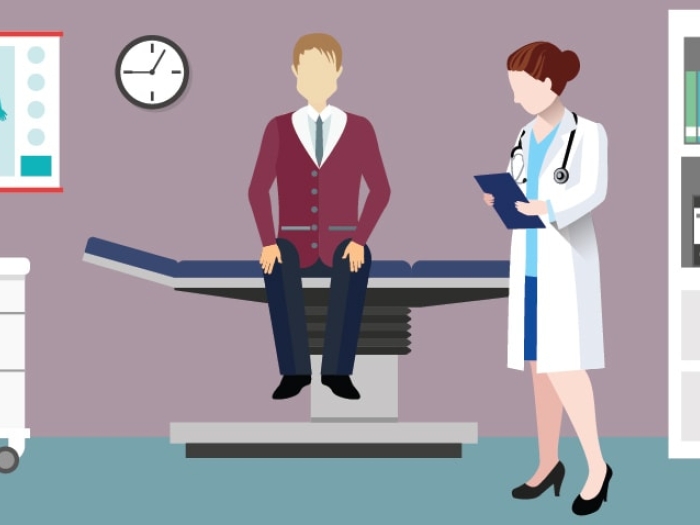A family history of cancer had been a longtime fact of life for one Michigan Medicine nurse. After digging deeper — and being diagnosed herself — she learned why.
7:00 AM
Author |

Lisa Sylvest is a cancer survivor with a long family history of the disease.
The Michigan Medicine nurse is also a detective.
MORE FROM MICHIGAN: Sign up for our weekly newsletter
She never met her father's parents but knew they lived in Denmark with their other son and daughter. As a child, Sylvest was told only that her grandmother died of a "female" cancer at age 54. When Sylvest was in high school, her uncle died of brain cancer, also at age 54.
Time passed, she entered nursing school and her aunt developed endometrial cancer. Sylvest later traveled to Denmark to meet her father's relatives face-to-face for the first time.
It wasn't until her father, Karl, was diagnosed with advanced colon cancer at age 68 that Sylvest — by then a gastroenterology nurse — knew something wasn't right.
Sylvest soon decided that another trip to Denmark was in order.
An inherited link
She would later find a common thread connecting their illnesses: a genetic mutation known as Lynch syndrome.
It took time to fully process the news.
"When my dad got cancer, I already knew about Lynch syndrome, but since I was told my uncle died of brain cancer and we didn't know much about Lynch syndrome at the time, I didn't connect the dots, even with meeting my Danish family for the first time when I was in college," Sylvest explains. "It wasn't until years later that I learned my uncle died of colon cancer that metastasized to the brain."
Today, doctors know that Lynch syndrome greatly increases the chances of developing colon and other cancers, including endometrial cancer, earlier in life than what is considered typical.
The most common hereditary colon cancer condition — present in 1 of every 300 people — Lynch syndrome is responsible for 2.5 percent of colon cancers.
Which is why those with Lynch syndrome should begin screenings and annual colonoscopies starting in their early 20s, experts say (average-risk patients, by comparison, needn't do so until age 50).
Family ties
Still, it wasn't until Sylvest was diagnosed at age 40 with endometrial cancer — becoming the third generation in her father's family with cancer — that the genetic connection clicked.
SEE ALSO: Collecting a Family's Cancer History: What You Should Ask
In 2006, she attended a Michigan Medicine Grand Rounds, a weekly presentation to medical staff, on Lynch syndrome, which persuaded her to get genetic testing for herself and to encourage her family on both sides of the Atlantic to do the same.
Sylvest's efforts paid off: She and a sister both tested positive for the condition. Her brother and younger sister chose not to be tested.
"When my sister saw the test result, she went straight to her gynecologist, and thank goodness she did, because she had endometrial cancer. Today she is alive and cancer-free," Sylvest says.
The two siblings traveled to Denmark in 2010 for a family meeting with their cousins to discuss genetic testing for Lynch syndrome. As a result, two cousins tested positive and one tested negative. Two other cousins have not been tested to date.
Spreading the word
The experience has given the steadfast detective gratitude and perspective.
"It has struck me that my family is very lucky," says Sylvest, who, after the trip, attended a Lynch syndrome symposium held annually at the Mayo Clinic in Rochester, Minnesota, where she met others in the same situation.
It also motivated her to get the word out by organizing a seminar for Lynch syndrome patients in 2014.
And the dialogue continues: A support group for Lynch syndrome and familial adenomal polyposis (FAP) patients will meet April 20 at the Cancer Support Community of Greater Ann Arbor. (For more information or to RSVP, call 734-975-2500).
Sylvest says she's glad to support the effort: "Families, community practitioners and the general public need to understand that Lynch is more than a genetic disorder that can lead to colon, rectal or endometrial cancer. It is complex, and we learn more about it every year."

Explore a variety of health care news & stories by visiting the Health Lab home page for more articles.

Department of Communication at Michigan Medicine
Want top health & research news weekly? Sign up for Health Lab’s newsletters today!





